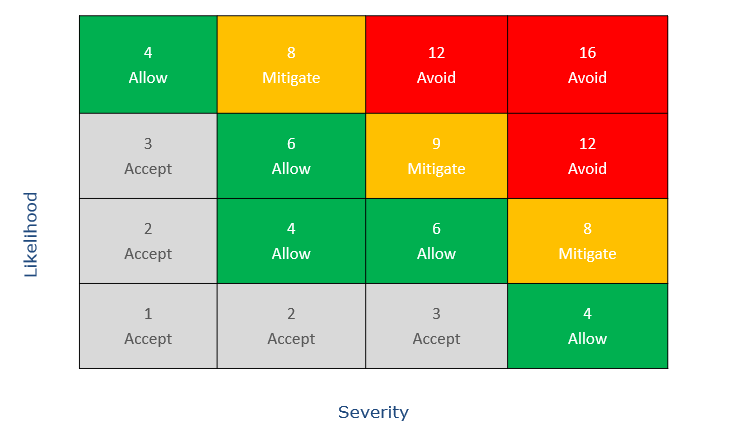Pristine School Of Management
Available courses

The purpose of this unit is to assist learners to gain a better
understanding of the importance of risk management in business
organizations, as well as to design an effective risk management
strategy and evaluate risk financing choices.
- Teacher: stanley akpevwe
- Teacher: Pristine Pristine

 The critical assessment of strategy concerning the formation and
continual improvement of performance standards; the establishment and
maintenance of an effective risk management system; all areas of risk
management, including but not limited to health and safety,
environmental, and security; and the planning and alignment of risk
objectives with other corporate strategies.
The critical assessment of strategy concerning the formation and
continual improvement of performance standards; the establishment and
maintenance of an effective risk management system; all areas of risk
management, including but not limited to health and safety,
environmental, and security; and the planning and alignment of risk
objectives with other corporate strategies.
- Teacher: stanley akpevwe
- Teacher: Pristine Pristine

The goal of this module is for learners to gain a better understanding
of the legislative frameworks that influenced the development of risk
assessment strategies in organizations, as well as to master the
fundamentals of ISO standards. ISO is a globally recognized
international standard that establishes risk management principles and
procedures. These standards give risk management principles, a
framework, and a procedure that any organization can utilize. The
principles of ISO standards will be taught to the students.
- Teacher: stanley akpevwe
- Teacher: Pristine Pristine

The goal of this module is to provide students with a basic grasp of the
main ideas and techniques that are used to create current risk analysis
models. It teaches students the fundamentals of risk analysis. These
fundamental ideas are then applied to a variety of current risk analysis
modeling tools. This class will equip students with the knowledge and
abilities necessary to implement these strategies in real-world
settings.
- Teacher: stanley akpevwe
- Teacher: Pristine Pristine

Learners will examine the current organizational need for governance,
which will lead to the appraisal of excellent practice in corporate
affairs, in this unit. This module gives the student a knowledge of the
impact of law and global integration on organizational choices,
policies, procedures, and activities.
- Teacher: stanley akpevwe
- Teacher: Pristine Pristine
- Teacher: Pristine Pristine
- Teacher: Pristine Pristine
- Teacher: Pristine Pristine
- Teacher: Pristine Pristine
- Teacher: stanley akpevwe

The aim of this unit is to develop learners’ understanding of research principles including the
formulation of research proposals, literature reviews, referencing, data collection using
interviews and surveys, questionnaire design, statistical analysing using SPSS, qualitative
data, and methods for drawing conclusions from the analysed data.
- Teacher: bernard elaho

The aim of this unit is to develop learners’ understanding of supply chain and operations
management, including its scope, impact and importance as well as the strategic decisions
that need to be made in today’s world of global supply and global markets, taking into
account the major competitive drivers. The unit discusses supply chain and operations
management practices and approaches in a range of contexts
- Teacher: bernard elaho

The aim of this unit is to develop learners’ understanding, knowledge and skills of
sustainable operations management, including key elements of sustainability and their
importance to businesses, the business drivers and barriers affecting the move towards
sustainability, the different practices across the supply chain that can be worked upon to
improve sustainability as well as the performance measures and the business impact of
sustainability. A variety of different sectors are explored.
- Teacher: bernard elaho
- Teacher: stanley akpevwe
- Teacher: stanley akpevwe

Craft your professional roadmap to excellence with our Professional Certificate Course in Advanced Project and Logistics Management.
What You’ll Learn:
- Portfolio Management and Organisational Strategy
- Project Management Office and Project Charter
- Supply Chain Management & Integration Information Technology
- Project Risk Management

Craft your professional roadmap to excellence with our Professional Certificate Course in Health and Social Care Strategies and Policies.
What You’ll Learn:
- Health in All Policies
- Basic Concepts of Strategic Management
- Public Health: Functions and Strategic Planning
- Human Health, Public Health, and Health Promotion

Advance your knowledge with our Professional Certificate Course in Investment Analysis.
What You’ll Learn:
- Concept of Securities
- The Regulation of Security Trading
- The Principles of Investment Theory
- Undersatnding the Principles of Taxation
- Financial Services Industry
- Portfolio Management

Advance your career with our Professional Certificate Course in Logistics Management.
What You’ll Learn:

Transform your career with our Professional Certificate Course in Operations and Information Management for Project Managers.
What You’ll Learn:

Craft your professional roadmap to excellence with our Professional Certificate Course in Procurement and Supply Management.
What You’ll Learn:
- Supply Management & Roles of Procurement
- Organizational Structures for Procurement
- Spend Analysis & Portfolio Purchasing Model
- Request for Information and Contracts

Craft your professional roadmap to excellence with our Strategic Human Resource Management Course.
What You’ll Learn:
- The Role of Strategic Human Resource
- Human Resource Planning
- Legal and Ethical Issues in Developing Human Resource Policy
- Planning Effective Human Resource Strategies
- Analysing Leadership and Management Theory

Advance your career with our Professional Certificate Course in Strategic Leadership.
What You’ll Learn:
- Principles, Concepts, and Approaches to Leadership
- Leadership Influences: Individual, Team, and Organisation
- Leadership and Organisational Performance
- Ethical Decision Making and Organisational Value

Transform your marketing career as a next generation professional in a dynamic economy with our Professional Certificate Course in Strategic Marketing.
What You’ll Learn:
- Principles of Strategic Marketing
- Assessing Internal and Competitive Business Environments
- Competitive Advantage and Strategic Options
- Market Segmentation and Brand Positioning

Advance your knowledge with our Professional Certificate Course in Strategic Risk Management.
What You’ll Learn:
- Concept and Types of Strategic Risk Management
- Corporate Social Responsibility & Corporate Governance
- Enterprise, Business Environment, and Risk Management
- Strategic Planning
- From Business Continuity to Business Resilience
- Teacher: stanley akpevwe
